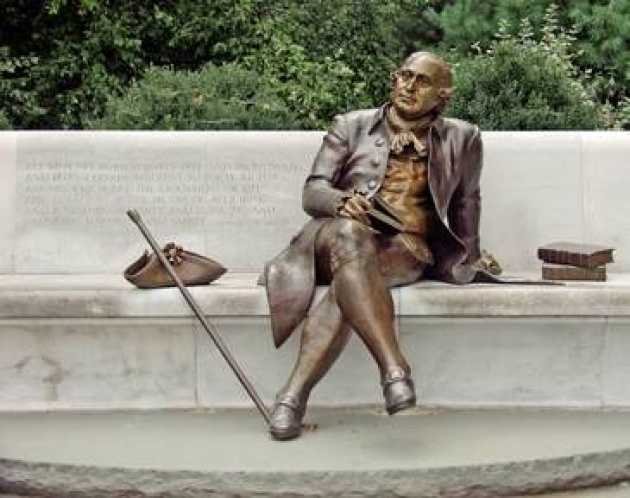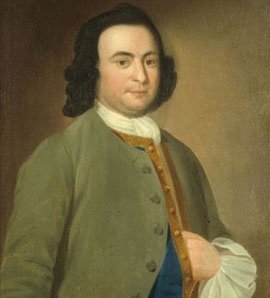

Perhaps as many American colonialists opposed American independence from the British Crown as supported it. Some of these “Loyalists” fought along the British Red Coats, were “lynched” for their presumed treachery and many ultimately left the newly independent 13 colonies for fear or preferring to continue to live under the Crown, (mostly to Canada). Nonetheless, history chooses to remember the war for American independence as a war against British imposers and as a “Revolution” rather than a war between the colonialists professing different visions of their political allegiance and future. Why was it a “Revolution,” regardless of branding.
Who was the Progressive versus the Reactionary?
The Loyalists and British, it has been argued, promoted some even more enlightened views than their independence minded countrymen or "Patriots". In the southern colonies, many African Americans sided with the Crown. Britain was perhaps already moving to abolish the trade (1787 and slavery as institution in 1833). However, it was perhaps the “Dunmore Proclamation” which promised freedom to slaves of Patriots who escaped their masters that marked the demarcation. It is estimated that over 20,000 “negroes” fought for the British, including "Dunmore’s Ethiopian Brigade." (John Murray, Earl of Dunmore was Royal Governor of Virginia).
However, also 5,000 “negroes” fought on the independence or Patriot side, including some of the first Minutemen in the Massachusetts colony. It is proclaimed that the first person killed at the outset during the “Boston Massacre” was a black Patriot, Crispus Attucks.
Many independence minded Americans, especially among the pioneers, resented British efforts to curtail westward expansion and further incursion into Native American lands. The Indian had reason for concern as subsequent history would indicate. Most Native Americans viewed the Crown as more to their word regarding past treaties and arrangements while seeing the American as lusting for their land. Again though, many Indians did fight on the side of the Patriots.
What is it then that makes the American Revolution so worthy of the title, let's say as compared to the label civil war or mere rebellion? In my view, it is the leadership of the elite who embodied the ideals of the Enlightenment Age just-reached zenith, and the fundamental ideology that power comes from rather than is given to the freeperson(s) by the ruler.
The Magna Carta has generally been professed as the foundation of the British system of governance and rights. In a historical context though, it was a delegation of power by the monarch to his subjects. On the other hand, the American Revolution is based upon the overriding principle that authority has its source within the governed, and who entrust it to their leaders through selection of representatives – the inalienable rights of man include choosing leadership.
Recognizing Human Frailties & Resisting Hypocrisy
Benjamin Franklin, Thomas Jefferson, George Washington, Alexander Hamilton, John and Samuel Adams were all flawed human beings with some frequently cited contradictions. However, this is what made them visionary and revolutionary as a group. Deviance largely avoided decadence, and they understood that the new fledgling revolution and country needed to be protected from whims of leaders like themselves, to lesser or greater degree, who all might be seduced by power. In this way, George Washington’s instinct may have even outshined military leadership when as politician he resisted efforts by others and his ego to be pronounced king or president for life. They may not have lived an exemplary personal life, whatever that may mean anyway, but they nurtured Enlightenment ideas, whether linked to religion or not, in the development phase of a country after the battle was won but where so many of more current revolutions have been lost.
George Mason & the Bill of Rights
One Patriot stands out in my view among others, as mentor to Thomas Jefferson and George Washington and formulator of ideals. George Mason was the force behind the 1776 “Virginia Declaration of Rights.” This became the basis for the “Bill of Rights” in the US Constitution. Many Americans may confuse the American Declaration of Independence with the subsequently adopted United States Constitution. The two are complementary but doubtful if we would perceive the Revolution today as such without the Constitution, particularly the “Bill of Rights.”
George Mason (PHOTOs ABOVE including monument in Washington Mall) was a slaveholder who found the notion of slavery repugnant. Like so many of his “Founding Fathers,” he was a contradiction but perhaps even more aware of distinction with hypocrisy. He did not desire public office even as he worked as his state’s/colony’s representative. In the end, his greatest act was in refusing to sign the US Constitution unless it incorporated the Bill of Rights, its first 10 amendments. He is a personal inspiration and proof that the greatest contributions may be made by resisting the title but embracing even more boldly the responsibility and principle.
Bosnia to Egypt: Today’s Revolution, Civil War or Rebellion
We have witnessed many independence movements and revolutions in the last two decades, (perhaps only surpassed by the colonial independence movements realized in the post WWII era and American liberations of late 18th and early 19th century.) From Bosnia & Herzegovina to Egypt, currently the balance of history remains as to whether to apply the label of civil war, rebellion or revolution. Will the Arab Spring flounder into another series of post-colonial rebellions that delivered little democratic, social, or economic reform but in hindsight were more about building new family, tribal or party dynasties? Without individual freedoms claims of rights in the name ethnic, racial, religious, tribal and/or gender identity may be exploited or transient. Of course, Americans have much to learn from their own history, and this is probably the most disappointing evolution of the revolutionary America – how little we know and how easily we grasp for the rhetoric of convenience, whether God’s name or the American ideal, or the two intertwined. I had to choose to be an American, and with affection as well as intellectual commitment have chosen to study and absorb my American identity. I’m not born into my identity but ever day choose to exercise it.
We are Our Own Masters from Birth
On the battlefield, the distinction between, Patriot and Loyalist in the American Independence War may have been difficult to recognize. It was a brutal conflict even without many of the “ethnic/religious divisions” that seem to be the rationale for war crimes and genocide today. Summary execution and punishment were not alien to either camp. The name of God was of course employed as convenience and tactic might dictate. What differentiates the American Revolution though from civil war or rebellion is that God and/or Nature had made the one grant of freedom of choice and will that no worldly power in the name of monarch or state could claim to intercede between – we are our own masters from birth.
By Ambassador Muhamed Sacirbey
Facebook - Become a Fan at "Diplomatically Incorrect"
Twitter - Follow at DiplomaticallyX



